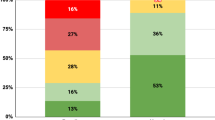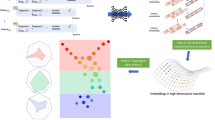Abstract
The aim of this study was to assess whether the association between angiotensin-converting enzyme (ACE) inhibitor use and the incidence of treated diabetes mellitus is modified by genetic polymorphisms in the renin-angiotensin system (RAS).In a nested case–control study, treated hypertensive patients were genotyped for ACE (insertion (I)/deletion (D)), angiotensinogen (AGT; M235T) and angiotensin II type 1 receptor (AGTR1; A1166C). Cases of newly treated diabetes were identified based on pharmacy records and controls were not yet drug treated for diabetes (case:control ratio 1:10). Self-administered questionnaires and physical examinations were used to assess risk factors for diabetes mellitus. Logistic regression was used to calculate the relative risk of diabetes associated with ACE inhibitor use relative to other antihypertensive treatment, stratified by the RAS genotypes. Among 205 cases and 2050 controls, homozygous 1166A carriers of the AGTR1 gene had a significantly decreased incidence of diabetes associated with current use of ACE inhibitors (odds ratio, OR: 0.47; 95% CI: 0.26–0.84), whereas this incidence was increased among 1166C allele carriers (OR: 1.32; 95% CI: 0.81–2.14). The interaction OR was 3.21 (95% CI: 1.53–6.75). ACE I allele carriers had a significantly reduced incidence of diabetes associated with ACE inhibitors use (OR: 0.63; 95% CI: 0.41–0.98), whereas DD homozygotes had no reduced risk (OR: 0.95; 95% CI: 0.46–1.96). The risk of diabetes associated with ACE inhibitor use was not significantly modified by the AGT-M235T polymorphism. Treatment with ACE inhibitors in hypertensive subjects significantly reduces the occurrence of diabetes in homozygous 1166A carriers of the AGTR1 gene and carriers of the ACE I allele, but not in 1166C allele carriers of the AGTR1 gene and in homozygous ACE D allele carriers.
This is a preview of subscription content, access via your institution
Access options
Subscribe to this journal
Receive 12 digital issues and online access to articles
$119.00 per year
only $9.92 per issue
Buy this article
- Purchase on SpringerLink
- Instant access to full article PDF
Prices may be subject to local taxes which are calculated during checkout

Similar content being viewed by others
References
Eckel RH, Grundy SM, Zimmet PZ . The metabolic syndrome. Lancet 2005; 365 (9468): 1415–1428.
Elliott WJ, Meyer PM . Incident diabetes in clinical trials of antihypertensive drugs: a network meta-analysis. Lancet 2007; 369 (9557): 201–207.
Jandeleit-Dahm KA, Tikellis C, Reid CM, Johnston CI, Cooper ME . Why blockade of the renin-angiotensin system reduces the incidence of new-onset diabetes. J Hypertens 2005; 23 (3): 463–473.
Verschuren WMM, van Leer EM, Blokstra A, Seidell JC, Smit HA, Bueno de Mesquita HB et al. Cardiovascular disease risk factors in the Netherlands. Neth J Cardiol 1993; 4: 205–210.
Lievers KJA, de Boer A, Stricker BHCh, de Wijer BMA, Kroon AA, de Leeuw PW et al. Interactions between genetic polymorphisms and antihypertensive drugs in the treatment of hypertension. Eur J Hum Genet 2004; 12 (1): 303.
Russ AP, Maerz W, Ruzicka V, Stein U, Gross W . Rapid detection of the hypertension-associated Met235 → Thr allele of the human angiotensinogen gene. Hum Mol Genet 1993; 2 (5): 609–610.
Rigat B, Hubert C, Alhenc-Gelas F, Cambien F, Corvol P, Soubrier F . An insertion/deletion polymorphism in the angiotensin I-converting enzyme gene accounting for half the variance of serum enzyme levels. J Clin Invest 1990; 86 (4): 1343–1346.
Henskens LH, Spiering W, Stoffers HE, Soomers FL, Vlietinck RF, de Leeuw PW et al. Effects of ACE I/D and AT1R-A1166C polymorphisms on blood pressure in a healthy normotensive primary care population: first results of the Hippocates study. J Hypertens 2003; 21 (1): 81–86.
Knaapen AM, Ketelslegers HB, Gottschalk RW, Janssen RG, Paulussen AD, Smeets HJ et al. Simultaneous genotyping of nine polymorphisms in xenobiotic-metabolizing enzymes by multiplex PCR amplification and single base extension. Clin Chem 2004; 50 (9): 1664–1668.
Veldman BA, Spiering W, Doevendans PA, Vervoort G, Kroon AA, de Leeuw PW et al. The Glu298Asp polymorphism of the NOS 3 gene as a determinant of the baseline production of nitric oxide. J Hypertens 2002; 20 (10): 2023–2027.
World Health Organization. Guidelines for ATC Classification and DDD Assignment. WHO Collaborating Centre for Drug Statistics Methodology—Nordic Council on Medicines: Oslo, 1999.
Villard E, Tiret L, Visvikis S, Rakotovao R, Cambien F, Soubrier F . Identification of new polymorphisms of the angiotensin I-converting enzyme (ACE) gene, and study of their relationship to plasma ACE levels by two-QTL segregation-linkage analysis. Am J Hum Genet 1996; 58 (6): 1268–1278.
Rothman K, Greenland S . Modern Epidemiology, 2nd edn. Lippincott/Raven: Philadelphia, PA, USA, 1998.
Khoury MJ, Flanders WD . Nontraditional epidemiologic approaches in the analysis of gene–environment interaction: case–control studies with no controls!. Am J Epidemiol 1996; 144 (3): 207–213.
Yu HM, Lin SG, Liu GZ, Zhang YQ, Ma WJ, Deng CY . Associations between CYP11B2 gene polymorphisms and the response to angiotensin-converting enzyme inhibitors. Clin Pharmacol Ther 2006; 79 (6): 581–589.
Yvan-Charvet L, Even P, Bloch-Faure M, Guerre-Millo M, Moustaid-Moussa N, Ferre P et al. Deletion of the angiotensin type 2 receptor (AT2R) reduces adipose cell size and protects from diet-induced obesity and insulin resistance. Diabetes 2005; 54 (4): 991–999.
Schelleman H, Stricker BH, De Boer A, Kroon AA, Verschuren MW, Van Duijn CM et al. Drug-gene interactions between genetic polymorphisms and antihypertensive therapy. Drugs 2004; 64 (16): 1801–1816.
Tiret L, Rigat B, Visvikis S, Breda C, Corvol P, Cambien F et al. Evidence, from combined segregation and linkage analysis, that a variant of the angiotensin I-converting enzyme (ACE) gene controls plasma ACE levels. Am J Hum Genet 1992; 51 (1): 197–205.
Rett K, Lotz N, Wicklmayr M, Fink E, Jauch KW, Gunther B et al. [Improved insulin action by ACE inhibition in type-2 diabetics]. Dtsch Med Wochenschr 1988; 113 (7): 243–249.
Huang XH, Rantalaiho V, Wirta O, Pasternack A, Koivula T, Hiltunen T et al. Relationship of the angiotensin-converting enzyme gene polymorphism to glucose intolerance, insulin resistance, and hypertension in NIDDM. Hum Genet 1998; 102 (3): 372–378.
Sethi AA, Nordestgaard BG, Tybjaerg-Hansen A . Angiotensinogen gene polymorphism, plasma angiotensinogen, and risk of hypertension and ischemic heart disease: a meta-analysis. Arterioscler Thromb Vasc Biol 2003; 23 (7): 1269–1275.
Gabriely I, Yang XM, Cases JA, Ma XH, Rossetti L, Barzilai N . Hyperglycemia modulates angiotensinogen gene expression. Am J Physiol Regul Integr Comp Physiol 2001; 281 (3): R795–R802.
Acknowledgements
This study was funded by an unrestricted grant from Novo Nordisk BV and by the Scientific Institute for Dutch Pharmacists (WINAp). The department employing authors OHK, AB, ERH, and OB has received unrestricted research grants from GlaxoSmithKline, Organon, and Merck for the conduct of for pharmacoepidemiological research.
Author information
Authors and Affiliations
Corresponding author
Additional information
Conflict of interest
None of the above-mentioned grants are related to the current study and have no conflict of interest.
Rights and permissions
About this article
Cite this article
Bozkurt, Ö., Verschuren, W., van Wieren-de Wijer, B. et al. Genetic variation in the renin-angiotensin system modifies the beneficial effects of ACE inhibitors on the risk of diabetes mellitus among hypertensives. J Hum Hypertens 22, 774–780 (2008). https://doi.org/10.1038/jhh.2008.62
Received:
Revised:
Accepted:
Published:
Issue date:
DOI: https://doi.org/10.1038/jhh.2008.62
Keywords
This article is cited by
-
Drug-induced hyperglycaemia and diabetes: pharmacogenomics perspectives
Archives of Pharmacal Research (2018)
-
Estimating measures of interaction on an additive scale for preventive exposures
European Journal of Epidemiology (2011)



